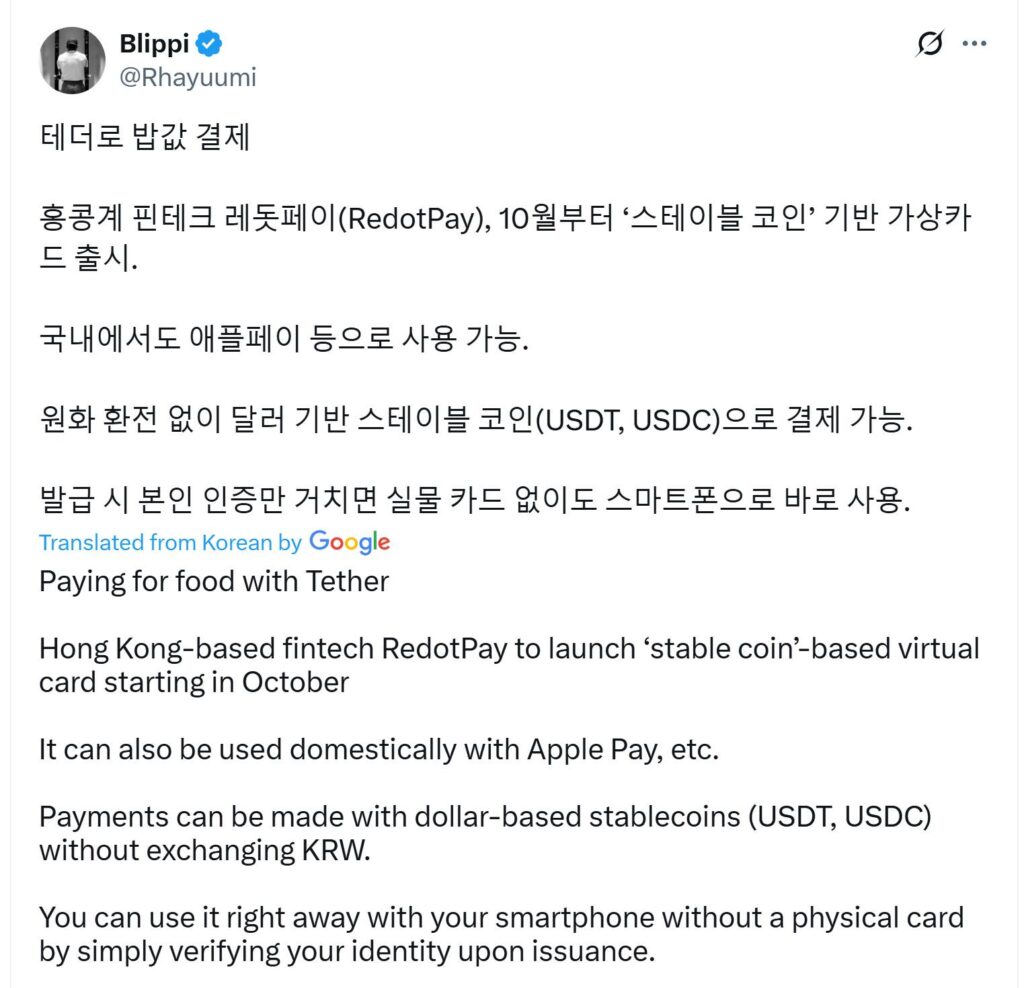In an exciting development for the cryptocurrency landscape, Hong Kong-based fintech firm RedotPay has launched its cryptocurrency-enabled payment cards in South Korea, aiming to carve out a niche in a market that is typically ruled by traditional credit card companies and established mobile payment platforms. According to a report from The Korea Economic Daily on May 9, these innovative cryptocurrency debit cards—available in both physical and virtual forms—can be used at any Korean merchant accepting Visa.
This launch marks a crucial step in RedotPay’s global expansion efforts. The company, which was founded in 2023, has made considerable strides since it began soft launching its crypto card program in late 2024, quickly amassing over 4 million users worldwide. In South Korea, customers can acquire a virtual card for just $10 or a physical card for $100, with a straightforward verification process that requires minimal personal information like name, address, and ID.
“You can use it right away with your smartphone without a physical card by simply verifying your identity upon issuance,” shared one user on social media platform X.
RedotPay’s cards support popular cryptocurrencies including Bitcoin (BTC), Ether (ETH), and stablecoins like USDC and USDT. What sets these cards apart, however, is the real-time payment and refund capability with stablecoins. When users make purchases, stablecoins are instantly deducted from their wallets, and in the case of transaction cancellations, refunds are processed swiftly within minutes.
The timing of RedotPay’s introduction of these cards may prove fortuitous, as cryptocurrency adoption continues to grow in South Korea. Recent reports indicate that over 16 million people in the country now hold cryptocurrencies. This rising interest in digital currencies has also sparked discussions around crypto policies in the South Korean presidential race, with candidates like Democratic Party leader Lee Jae-myung advocating for the approval of spot crypto exchange-traded funds (ETFs) and other crypto-friendly initiatives. The ruling People Power Party has also made headlines with promises to reform crypto regulations and enhance market accessibility.
RedotPay Launches Cryptocurrency Payment Cards in South Korea
Hong Kong-based fintech firm RedotPay has introduced its cryptocurrency-enabled payment cards in South Korea, aiming to disrupt the traditional credit card market. Here are the key points:
- Launch of Crypto Payment Cards:
- RedotPay’s cryptocurrency debit cards are available both physically and virtually.
- Accepted at all Korean merchants supporting Visa, enhancing crypto accessibility.
- Global Expansion:
- Partnership with Visa and StraitsX enhances cross-border payment capabilities.
- Rapid growth since the soft launch of its crypto card program in late 2024.
- Over 4 million users globally as of now.
- Cost and Verification:
- Virtual card available for $10, while the physical card costs $100.
- Minimal verification requirements: name, address, and ID.
- Supported Cryptocurrencies:
- Cards support major cryptocurrencies like Bitcoin (BTC), Ether (ETH), and stablecoins (USDC, USDT).
- Allows loading from multiple blockchains such as Solana and Polygon.
- Real-time Payment System:
- Instant deduction of stablecoins upon purchase.
- Fast refunds for canceled transactions processed within minutes.
- Compatibility with Apple Pay:
- RedotPay’s cards can be used with Apple Pay in Seoul, offering a competitive advantage.
- Current Apple Pay access is limited primarily to Hyundai Card customers.
- Growing Crypto Adoption:
- Over 16 million people in South Korea reportedly hold cryptocurrencies.
- Crypto legislation is becoming a significant topic in the 2025 presidential race, with candidates proposing crypto-friendly measures.
“You can use it right away with your smartphone without a physical card by simply verifying your identity upon issuance.”
This development has the potential to impact readers by increasing the accessibility of cryptocurrency for daily transactions, enabling faster payments, and fostering a broader acceptance of digital currencies in everyday commerce.
RedotPay’s Crypto Payment Cards: A Game Changer for South Korea’s Fintech Landscape
RedotPay, the burgeoning fintech player from Hong Kong, is making waves as it launches cryptocurrency-enabled payment cards in the South Korean market. This step positions RedotPay as a formidable competitor to established credit card providers and mobile payment platforms, currently defining the local landscape. With the rapid growth of crypto adoption in South Korea—home to over 16 million digital asset holders—RedotPay’s entry comes at a pivotal time when users are increasingly receptive to integrated crypto solutions.
Competitive Advantages
One of RedotPay’s most significant advantages is its partnership with Visa and StraitsX, enabling seamless crypto transactions across various platforms. The introduction of both physical and virtual cards accepted at any establishment that supports Visa provides immediate accessibility for users. Additionally, minimal verification requirements for obtaining these cards make it attractive for newcomers to the crypto world. The real-time stablecoin deduction feature for transactions, along with instantaneous refunds, is designed to enhance user experience significantly. Moreover, its compatibility with Apple Pay—still limited to specific customers in South Korea—gives RedotPay a unique leverage point, making crypto payments more convenient for tech-savvy consumers.
Disadvantages and Challenges
However, entering a market dominated by traditional financial institutions does present challenges. RedotPay must navigate intricate regulatory landscapes and varying consumer perceptions of cryptocurrency, which can be seen as both innovative and risky. Competition from domestic players who are familiar with local consumer behavior could hinder RedotPay’s growth. Furthermore, the fintech firm’s success hinges on continued regulatory support, especially in light of the ongoing presidential campaign, where crypto promises from candidates could reshape public trust and interest in such financial products.
Target Audience and Possible Impacts
The launch of RedotPay’s cryptocurrency cards stands to benefit a range of consumers, particularly tech-savvy millennials and Gen Z users who are already engaged in digital assets. The user-friendly approach to accessing crypto payment solutions could also foster broader adoption among those hesitant about cryptocurrency. However, its success might create problems for traditional financial institutions, which may feel pressured to innovate their offerings to retain market share. Existing payment processors and credit companies that do not adapt quickly could find themselves at a competitive disadvantage in a rapidly changing financial environment.















